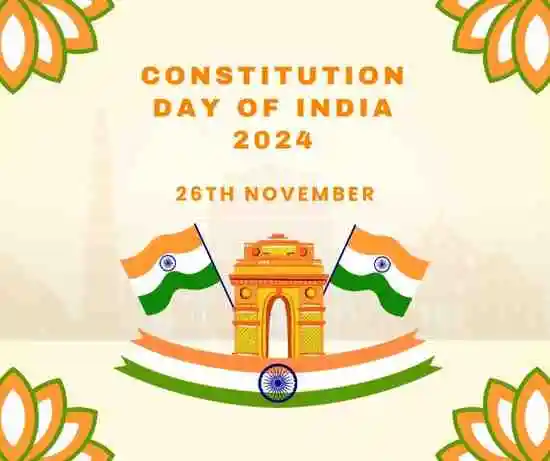Constitution of India was marked on November 26, 2024, by celebrating the 75th adoption anniversary of its Constitution. President Droupadi Murmu inaugurated the year-long celebrations with a joint address to both Houses of Parliament in the iconic Central Hall of Samvidhan Sadan (formerly the Old Parliament Building).
Constituted on November 26, 1949, as India‘s Constitution, it established the world‘s largest democracy. Though it took effect on January 26, 1950, to make India a republic, since 2015, the 26th of November has been celebrated as Constitution Day in memory of the founding fathers of this great document.
President Murmu‘s Address
In her address to the Parliament, President Murmu emphasized the importance of the Constitution while stating that it is the fruit of years of sacrifice, struggle, and ingenuity by India‘s freedom fighters and leadership. She underscored that the values of the Constitution remain pertinent during Indian democracy‘s stalwartness and demanded lawmakers to work with dedication and integrity in keeping up with the constitution.
President Murmu released commemorative editions of the Constitution in Maithili and Sanskrit as a nod to India‘s rich linguistic heritage. A special coin and postage stamp were also launched on this occasion-the office said it was part of its efforts to pay homage to the legacy of the Constitution.
“A Year of Celebrations Under ‘Hamara Samvidhan, Hamara Swabhiman‘“.
As a tribute, the government initiated a yearly campaign named “Hamara Samvidhan, Hamara Swabhiman“ (Our Constitution, Our Pride). In the realm of digital media, it created a website, https://constitution75.com, for citizen engagement with the history and significance of the Constitution through interactive features, educational resources, and events.
Recollections of National Leaders
By Vice President Jagdeep Dhankhar
Vice President Jagdeep Dhankhar addressed the joint session of Parliament reflecting on the role of the Constitution in protecting democracy. Calling members of Parliament as the “custodians of democracy“, the Vice President called for protection of democratic institutions through constructive dialogue and meaningful debates. Referring to the Emergency of 1975, he termed it a dark period when all fundamental rights were suspended; he urged the citizens to remain vigilant in defending the freedoms and freedom vouchsafed to them. Union Home Minister Amit Shah
Union Home Minister Amit Shah said he loved the Constitution, labeling it as the “strength of Indian democracy.“ Posting a message from his X (formerly Twitter) account, Shah said the Constitution serves to ensure justice, equality, and unity among all citizens–the essence of national integrity–called upon the nation to pledge its commitment to building a more robust India guided by the Constitution‘s principles.
Congress President Mallikarjun Kharge
Congress President Mallikarjun Kharge said the struggle to defend the ethos of the Constitution must be re-ignited. He urged citizens to protect core values placed inside the document and to uphold the vision of its framers. “The struggle to defend India‘s inherent philosophy must be reinvigorated,” he said, marking the occasion as a moment for national reflection.
The Legacy of the Constitution
The framing of the Constitution was not spontaneous, but rather, it was the culmination of decades of freedom struggle. The Constituent Assembly, first sitting on December 9, 1946, represented the collective aspirations of a newly independent nation. Chaired by Dr. Rajendra Prasad, this Assembly‘s work would be guided by luminaries like Dr. B.R. Ambedkar, Jawaharlal Nehru, and Sardar Vallabhbhai Patel, among others.
The adoption of the Constitution on November 26, 1949, marks a landmark date in the history of India. Here, Dr. Ambedkar, often known as the architect of the Constitution, described it as an effort to translate the ideals of justice, liberty, equality, and fraternity into governance structures. These values remain as relevant today as they were 75 years ago.
Celebrate at the Supreme Court
Later in the day, Prime Minister Narendra Modi attended Constitution Day function held at the Supreme Court. At the event, the Prime Minister released the Annual Report of the Indian Judiciary (2023-24), reiterating the significance of judiciary in this age of democratized constitutionalism.
Chief Justice of India Sanjiv Khanna was also present at the event along with other senior judges, reaffirming judiciary‘s commitment to preserve sanctity of the Constitution.
Constitution Day Celebrations
Decorative elegance adorned the Central Hall of Samvidhan Sadan as part of the celebration, evoking memories of an earlier phase when that hall was used for Constituent Assembly debates. Special exhibits tell the complete story of how the Constitution was drafted and adopted, giving citizens an appreciation of its historical journey.
Educative programs, seminars, and cultural activities will be organized throughout the year, reaching out to the public for their participation and awareness. Through these programs, the government wants to foster the values of the Constitution especially among the younger generation.
The Pledge for a Stronger India
Today, on Constitution Day, the leaders and citizens remember the values preached by the Constitution and pledge commitment to them. Lok Sabha Speaker Om Birla, in his opening remarks, reminded the nation of the sacrifices that made the Constitution and appealed for a united effort to build a stronger India.
As the nation enters into the celebrations across one year, it would focus on the past, reflect upon the present, and envision a future in strict alignment with the Constitution.
As President Murmu said:
“Our Constitution is the outcome of years of penance, sacrifice, ingenuity, strength, and ability of our people. Let us celebrate its legacy and strive to uphold its values in our journey ahead.”
India‘s Constitution Day 2024 is a celebration of a historic document, democracy, unity, and the indestructible spirit of the nation. During the celebrations, this will remind them of the crucial role of the Constitution in Indian identity and aspirations.

